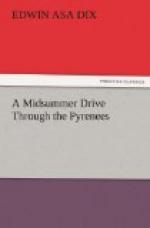Thus the Basques have a stiff record of independence; it keeps them in no little esteem, both with themselves and with their neighbors. Trains, travel, traffic, eat into their solidarity, and may in time disintegrate it; but a Basque has not yet lost a particle of his pride of clan; it is inborn and ineradicable; he would be no other than he is; “je ne suis pas un homme” he boasts, “je suis un Basque.” You note instinctively his straighter bearing among the neighboring French peasantry; you can often single out a Basque by his air. This hardens into a peculiar result: since they are all of the same high lineage, all are aristocrats; every Basque is ex officio a nobleman; this is seriously meant and seriously believed. There are no degrees of caste, the highest is the only; the entire race is blood-proud, ancestor-proud. A Basque family might not improbably have been the originators of that celebrated family tree which remarked, in a marginal note only midway back, that “about this time the Creation took place.”
They are not stilted in their pride, however; your true Basque cares much for his descent and little for its dignities. “Where the McGregor sits,” he would affirm, “there is the head of the table,” and so he cares nothing about the nominal headship. He lives a free, busy life in the hill-country or near the sea, stalwart, swarthy, a lover of the open air, apt at work and sufficiently enterprising, self-respecting, “proud as Lucifer and combustible as his matches,” in no case pinchingly poor, but rarely rich, and never in awe of his own coat-of-arms.




